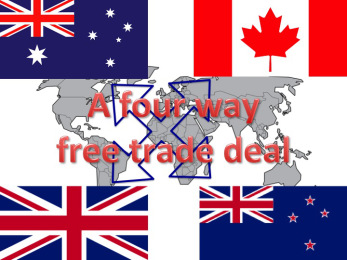What “it” and “this” are no one needed to tell me. But truly how stupid do you have to be to have made an arrangement with Obama after the election to send boat people from Nauru and Manus to the US? If Malcolm believed he was going to get points for having stood up to the US against Trump, as clueless as I have always thought him, he has plumbed levels of stupidity and political incompetence until now unimaginable. From The Australian:
Australia’s alliance with the US has hit its lowest point in decades, in a clash over a divisive refugee deal that led Donald Trump to berate Malcolm Turnbull in private before staging a public retreat from the agreement.
This morning the President has said he loves Australia and will “respect” the deal, but that nations are taking advantage of the US. White House spokesman Sean Spicer said his boss was “unbelievably disappointed” about the “horrible deal” and that refugees will only be allowed in the US if they pass extreme vetting. But Mr Trump’s top officials have tried to smooth over the rift, holding a meeting with ambassador Joe Hockey.
For Malcolm apparently to have tried to push Trump, by telling him that as a fellow businessman that a deal is a deal, must rank as politically incompetent as anything I have ever seen. That Trump now thinks of Malcolm as a flea-weight no-account fool only means he has the same assessment of the PM as the rest of us.
UPDATE WITH COMMENTS ON THE ARTICLE FROM THE OZ: There are now 830 comments on the linked article, and these are the top 22 in order from the list ordered according to “Top Comments” and there was no need to have stopped there.
1) Chronology is important here.
1. 10 months out from US presidential election, Turnbull visits US. He meets Hillary and snubs Trump.
2. In the weeks leading up to US presidential election, Turnbull does a deal with a dead duck President.
3. Turnbull and Obama agree to not announce it (hide the deal) until the US presedential election is over. They both want Hillary to get up, and the deal would be excellent ammunition for Trump in a campaign dominated by illegal immigration.
4. Trump wins. Turnbull panics.
5. Turnbull has to call Greg Norman to find out how to get in touch with Trump.
6. Turnbull announces deal publicly 5 days later, and before he has spoken to Trump about it.
7. Trump understandably gives him a smack down on the phone.
8. Turnbull spins the phone call, and in desperation to announce something good in his otherwise failing Prime Ministership, announces the deal as done.
9. Trump is annoyed that Turnbull couldn’t keep quiet. Trump has been placed in a contradictory position that could damage him politically.
10. Trump gives Turnbull a smack down on Twitter, and leaks the phone call to return the favour.
The problem exists because of Turnbull, and Turnbull alone.
– At no point has Turnbull invested in a personal relationship with Trump. Mostly because he exists in the same elitist bubble as people who predicted a thumping Hillary win.
– He did a sneaky deal with left wingers and helped hide it from voters in the US.
– He then tried to pump his own political fortunes up and didn’t care about the damage it might do to Trump.
Turnbull has to go. He is damaging the Liberal party and the nation.
2) I feel sympathy for Trump. Why should he in the American interest accept these illegal boat people who came to this country largely for economic opportunism, they have rampaged, trashed Manus island, we won’t take them, so why should Trump call on the American taxpayer to live in America?
3) Greg Sheridan in his column today notes, Trump’s reluctance to commit to actual numbers to be resettled in the US from Manus Island or Nauru is no different from Obama’s. The Obama administration gave Turnbull an “announceable”, a media event, a virtual solution to the resettlement issue which itself did not guarantee that the US would take a single person unless it was satisfied through its own vetting procedures.
Trump is right to ask “why”? What’s in it for America? He should take all the time he needs to scrutinise this “virtual solution”.




